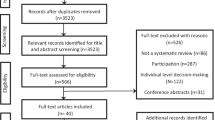Objective
Psychiatric advance directives (PADs) may include documenting advance instructions (AIs) and/or designating health care agents (HCAs). Laws authorizing PADs have proliferated in the past decade, but there has been little research regarding perceptions of barriers to the implementation of PADs among groups of mental health professionals.
Methods
A total of N=591 mental health professionals (psychiatrists, psychologists, and social workers) completed a survey regarding their perceptions of potential barriers to the effective implementation of PADs.
Results
Across the three professional groups barriers related to operational features of the work environment (e.g., lack of communication between staff, lack of access to the document) were reported at a higher rate than clinical barriers (e.g., inappropriate treatment requests, consumers’ desire to change their mind about treatment during crises). However, psychiatrists were more likely to report clinical barriers to implementation than both psychologists and social workers. In multivariable analyses, legal defensiveness, employment in public sector mental health services, and a belief that treatment refusals will outweigh the benefits of PADs were associated with more perceived barriers, whereas age and endorsing positive perceptions of PADs were associated with fewer perceived barriers.
Conclusion
Psychiatrists, psychologists and social workers tend to perceive significant potential barriers to PADs, related to operational aspects of these professionals’ work environment as well as certain clinical features of PADs for persons with severe mental illness. Additionally, legal defensiveness and general endorsement of PADs appear to shape perceptions of barriers to the effective implementation of PADs.
Similar content being viewed by others
References
Allen M. (2004). Hargrave v. Vermont and the quality of care. Psychiatric Services 55: 1067
Amering M., Denk E., Griengl H., Sibitz I., Stastny P. (1999). Psychiatric wills of mental health professionals: a survey of opinions regarding advance directives in psychiatry. Social Psychiatry and Psychiatric Epidemiology 34: 30–34
Amering M., Stastny P., Hopper K. (2005). Psychiatric advance directives: Qualitative study of informed deliberations by mental health service users. British Journal of Psychiatry 186: 247–252
Appelbaum P.S. (2004a). In reply: Hargrave v. Vermont and the quality of care. Psychiatric Services 55: 1067–1068
Appelbaum P.S. (2004b). Psychiatric advance directives and the treatment of committed patients. Psychiatric Services 55: 751–752,763
Atkinson J.M., Garner H.C., Gilmour W. (2004). Models of advance directives in mental health care: Stakeholder views. Social Psychiatry & Psychiatric Epidemiology 39: 667–672
Backlar P., McFarland B.H., Swanson J.W., Mahler J. (2001). Consumer, provider, and informal caregiver opinions on psychiatric advance directives. Administration & Policy in Mental Health 28(6): 427–441
Elbogen, E. B., Swartz, M. S., Van Dorn, R. A., Swanson, J. W., Ferron, J., Kim, M., et al. (in press). Clinician decision-making and attitudes on implementing psychiatric advance directives. Psychiatric Services.
Grol R. (1997). Personal paper: Beliefs and evidence in changing clinical practice. British Medical Journal 315: 418–421
Grol R., Wensing M. (2004). What drives change?: Barriers to and incentives for achieving evidence-based practice. Medical Journal of Australia 180: s57–s60
Hargrave v. Vermont 340 F. 3d 27 (2nd Circuit 2003).
Henderson C., Flood C., Leese M., Thornicroft G., Sutherby, K., Szmukler G. (2004). Effect of joint crisis plans on use of compulsory treatment in psychiatry: Single blind randomised controlled trial. British Medical Journal 329(July 17): 136–140
Joshi K.G. (2003). Psychiatric advance directives. Journal of Psychiatric Practice 9(4): 303–306
Keefe B., Pinals D.A. (2004). Durable power of attorney for psychiatric care. Journal of the American Academy of Psychiatry & the Law 32: 202–204
McCrary, S. V., Swanson, J. W., Coulehan, J., Faber-Langendoen, K., Olick, R. S., & Belling, C. (in press). Physicians’ legal defensiveness in end-of-life treatment decisions: Comparing attitudes and knowledge in states with different laws. Journal of Clinical Ethics.
Miller R.D. (1998). Advance directives for psychiatric treatment: A view from the trenches. Psychology, Public Policy, & Law 4(3): 728–745
Moulding N.T., Silagy C.A., Weller D.P. (1999). A framework for effective management of change in clinical practice: Dissemination and implementation of clinical practice guidelines. Quality in Health Care 8: 177–183
Noble L.M., Douglas B.C. (2004). What users and relatives want from mental health services. Current Opinion in Psychiatry 17: 289–296
Papageorgiou A., King M., Janmohamed A., Davidson O., Dawson J. (2002). Advance directives for patients compulsorily admitted to hospital with serious mental illness. British Journal of Psychiatry 181: 513–519
Peto T., Srebnik D., Zick E., Russo J. (2004). Support needed to create psychiatric advance directives. Administration and Policy in Mental Health 31: 409–418
Srebnik D., Brodoff L. (2003). Implementing psychiatric advance directives: Service provider issues and answers. Journal of Behavioral Health Services and Research 30(3): 253–268
Srebnik D., La Fond J. (1999). Advance directives for mental health treatment. Psychiatric Services 50(7): 919–925
Srebnik D., Russo J., Sage J., Peto T., Zick E. (2003). Interest in psychiatric advance directives among high users of crisis services and hospitalization. Psychiatric Services 54(7): 981–986
Srebnik D.S., Rutherford L.T., Peto T., Russo J., Zick E., Jaffe C., et al. (2005). The content and clinical utility of psychiatric advance directives. Psychiatric Services 56: 592–598
StataCorp. (2003). Stata Statistical Software: Release 8.0. College Station, TX, StataCorp LP
Swanson J.W., McCrary S.V. (1996). Medical futility decisions and physicians’ legal defensiveness: The impact of anticipated conflict on thresholds for end-of-life treatment. Social Science & Medicine 42: 125–132
Swanson, J. W., Swartz, M. S., Ferron, J., Elbogen, E. B., & Van Dorn, R. A. (In-press). Psychiatric advance directives among public mental health consumers in five U.S. cities: Prevalence, demand, and correlates. Journal of the American Academy of Psychiatry and Law.
Swanson J.W., Swartz M.S., Hannon M.J., Elbogen E.B., Wagner H., McCauley B.J., Butterfield M.I. (2003). Psychiatric advance directives: A survey of persons with schizophrenia, family members, and treatments providers. International Journal of Forensic Mental Health 2(1): 73–86
Swanson J.W., Tepper M.C., Backlar P.B., Swartz M.S. (2000). Psychiatric advance directives: An alternative to coercive treatment?. Psychiatry 63(2): 160–172
Varekamp I. (2005). Ulysses directives in the Netherlands: Opinions of psychiatrists and clients. Health Policy 70: 291–301
Vuckovich P.K. (2003). Psychiatric advance directives. Journal of the American Psychiatric Nurses Association 9: 55–59
ACKNOWLEDGMENTS
This work was supported by the Greenwall and MacArthur Foundations, a National Research Service Award Postdoctoral Traineeship from the NIMH to Drs. Van Dorn and Kim and NIMH K02 to Dr. Swanson.
Author information
Authors and Affiliations
Corresponding author
Rights and permissions
About this article
Cite this article
Dorn, R.A.V., Swartz, M.S., Elbogen, E.B. et al. Clinicians’ Attitudes Regarding Barriers to the Implementation of Psychiatric Advance Directives. Adm Policy Ment Health 33, 449–460 (2006). https://doi.org/10.1007/s10488-005-0017-z
Published:
Issue Date:
DOI: https://doi.org/10.1007/s10488-005-0017-z




